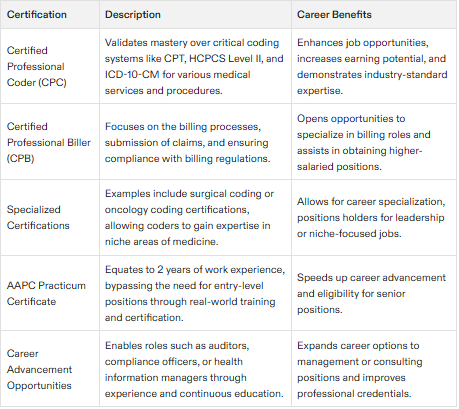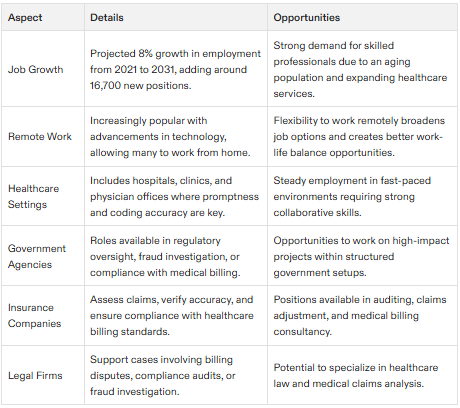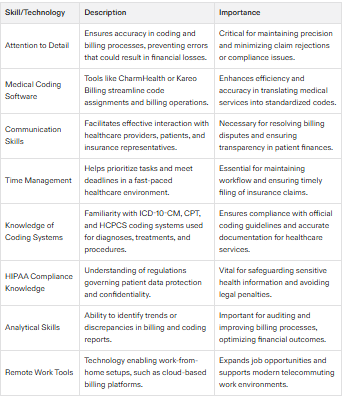Billing and Coding Career
The Ultimate Guide to a Successful Billing and Coding Career
Curious about a billing and coding career? Billing specialists play a crucial role in the healthcare system, ensuring proper payment processes and managing insurance claims, while offering promising job prospects and competitive salaries. In this guide, you’ll learn about the responsibilities, educational requirements, certifications, job outlook, and more. Whether you’re just starting or looking to advance, discover how to build a successful career in medical billing and coding.
Key Takeaways
Medical billers and coders are essential for maintaining efficient healthcare operations by managing patient records and facilitating insurance claims.
Certification, such as the CPC or CPB, is critical for advancing in coding careers, including medical billing and coding, and can lead to higher salaries and better job prospects.
The job outlook for medical billing and coding professionals is strong, with an expected 8% growth in employment due to the increasing demand for healthcare services and skilled professionals.
What Do Medical Billers and Coders Do?
Specialists in medical billing and coding, along with billing experts, play an integral role in assisting healthcare providers to obtain payment for their services. These professionals manage essential administrative duties that boost the efficiency and financial success of healthcare facilities. Their commitment to precise patient documentation and prompt billing promotes seamless operations within these establishments.
Coding specialists transform information from patient charts into standardized numeric or alphanumeric codes suitable for entry into medical billing systems. Such coding is vital as it represents various aspects of patient care, including diagnoses, treatments performed, and other relevant details necessary for proper insurance claims management. Subsequently, medical billers utilize this coded data when dealing with insurance entities – they file required claims and issue bills to patients based on these encoded procedures. Mastery over insurance protocols is crucial for these specialists to ensure accurate charge posting while adeptly navigating through intricate insurer guidelines.
For those involved in the realms of medical records handling, such as coders and billers, excellent communication skills are indispensable since they routinely coordinate with a network comprising patients, diverse healthcare personnel members like auditors or clinicians throughout discussions regarding costs—or when administering claim-related processes. The collaborative efforts among different sectors aid precision concerning both recordkeeping practices associated with medicine alongside critical elements related directly to the actual invoicing process itself.
Definition of Medical Billing
Medical billing is the intricate process of submitting and following up on claims with health insurance companies to secure payment for medical services rendered by healthcare providers. This essential function involves the use of medical terminology, coding systems, and specialized billing software to ensure that claims are processed accurately and efficiently. By translating healthcare services into standardized codes, medical billers facilitate the financial transactions that keep medical practices running smoothly.
Importance of Medical Billing in Healthcare
Medical billing is a cornerstone of the healthcare industry, playing a pivotal role in ensuring that healthcare providers receive timely and accurate payment for their services. This process is crucial for maintaining a steady cash flow, which allows healthcare facilities to operate effectively and continue providing high-quality patient care. Efficient medical billing reduces the administrative burden on healthcare providers, enabling them to focus more on patient care and less on financial management. In essence, accurate medical billing is vital for the sustainability and success of medical practices.
Steps to Start Your Billing and Coding Career
Embarking on a career in medical billing and coding requires thoughtful preparation and recognition of the essential steps involved. Consider aspects such as salary, job duties, future prospects, work setting, and your own fulfillment. Establishments like Healthcare Career College can offer crucial assistance throughout your educational journey. The medical coding career path is straightforward, requiring specific prerequisites and often suggesting an internship before certification.
Once you’ve fulfilled the initial requirements, proceed with completing your training program for medical billing and coding. Seek out an internship opportunity to gain hands-on experience. Then obtain certification in this field. By making a significant impact early on and fulfilling professional responsibilities effectively from the start, you’ll pave the way towards a successful career path.
Educational Requirements
A high school diploma or GED is the initial step toward a career in medical billing and coding. Educational pathways include diploma programs, which can be completed in under a year, or associate degrees, which take about two years. Some programs can be finished in as little as six months, especially with full-time enrollment. Ensure you meet the prerequisites set by the chosen program before starting your education.
Diploma programs offer a quicker entry into the field, while associate degrees provide a more comprehensive education. Both paths are valid, depending on your career goals and timeline. Financial aid options are available to help ease the financial burden of your education and prepare you for coding jobs.
Choosing the Right Medical Coding Program
Selecting an appropriate medical coding program is pivotal for sustained career achievement. Scrutinize your choices, keeping in mind the qualifications that employers prioritize. The necessity of accreditation cannot be overstated. Verify that the Accrediting Bureau of Health Education Schools has accredited the course you’re considering. Essential curriculum components to look for include comprehensive coverage of medical terminology, classifications used in coding, adherence to HIPAA regulations, and a thorough understanding of Medicare and Medicaid policies.
Allow your ultimate professional ambitions to steer the choice among various billing and coding programs available. Whether it’s your goal to qualify as a certified professional coder or carve out expertise in a distinct niche within this field, make sure that there’s congruence between these goals and what the program offers. Understanding the inner workings of a medical practice is crucial for roles such as medical billers, health services managers, and medical secretaries, who perform essential functions that support the overall efficiency and operation of these practices.
Upon picking out an apt medical billing and coding program, proceed with enrollment to embark on a rewarding pathway towards becoming skilled in medical billing and coding services.
Certification Process
Achieving professional certification is an essential milestone in the field of medical billing and coding. Key credentials such as the Certified Professional Biller (CPB) and Certified Professional Coder (CPC) are instrumental in enhancing employability and earning potential for individuals pursuing a career in this sector. To qualify, candidates must satisfy certain prerequisites and sit for their respective exams at authorized AAPC examination locations.
Successful completion of the CPC exam demonstrates proficiency in critical coding frameworks including CPT®, HCPCS Level II, and ICD-10-CM codes. Candidates who pass this rigorous test will be awarded with the title of CPC Apprentice (CPC-A), even if they have yet to fulfill the standard work experience requirements.
The attainment of a professional certificate can lead to expanded employment prospects, potentially higher wages, and pathways for progression within one’s career related to billing and coding practices.
Medical Billing and Coding Job Outlook
The prospects for a career in medical billing and coding are favorable, as the burgeoning healthcare sector is driving up demand for competent medical billers and coders. In the coming ten years, it’s projected that there will be around 16,700 new jobs available in this field, which translates to an employment growth rate of about 8% from 2021 through 2031. This surge is largely attributed to the need for more healthcare services paired with an increase in the senior population and the collaborative efforts of healthcare professionals.
There’s also a predicted shortage of physicians on the horizon that contributes to this heightened need for medical coders. Consequently, entering into a profession centered around medical billing and coding can prove both stable and rewarding financially. Those who gain appropriate education and certification stand poised to take advantage of these job opportunities in coding fields and forge prosperous careers within them.
Potential Work Environments for Medical Billers and Coders
Medical billing professionals and coding experts have the option to work in a variety of settings. The primary workplaces include hospitals, where promptness and precision are key due to the high-paced nature of these environments, and physicians’ offices, which tend to offer more consistent schedules.
Insurance companies recruit medical billers and coders for assessing claims’ correctness while legal firms as well as government agencies seek out specialists in coding for tasks like probing into allegations of billing malfeasance or scrutinizing healthcare industry regulations. These varied employment scenarios present an array of prospects for individuals aiming at specialization within their careers.
The inclination towards home-based employment has been gaining momentum within the sphere of medical billing and coding. With over one-third engaging remotely, these practitioners handle online medical billing duties from their homes. This development is advantageous not only because it improves balance between personal life and work, but also because it extends professional opportunities beyond local geography.
Remote Medical Billing Opportunities
The advancement of technology has revolutionized the field of medical billing, making remote work a viable and increasingly popular option. Many healthcare providers and medical billing companies now offer remote medical billing jobs, allowing medical billers to work from the comfort of their own homes. This flexibility is particularly beneficial for those who prefer a home-based work environment or have limited mobility. Remote medical billing not only broadens job opportunities but also helps healthcare providers tap into a wider pool of skilled professionals, enhancing the overall efficiency of their billing operations.
Skills Needed for Success in Medical Billing and Coding
Achieving proficiency in medical billing and coding demands distinct capabilities. Precise attention to detail is vital because even small mistakes in coding can lead to substantial errors in billing, resulting in financial losses. An extensive understanding of medical terminology is imperative for the correct interpretation and documentation of medical procedures.
Proficient communication abilities are critical when dealing with patients, healthcare providers, and insurers. Competent time management skills are necessary for setting priorities among tasks and adhering to important deadlines.
Cultivating these competencies will equip you with a solid foundation for triumph in the field of medical billing and coding.
Salary Expectations in Medical Billing and Coding
Salary expectations for medical billers and coders are promising. The median salary for medical records specialists, including medical billers and coders, was $48,780 as of May 2023. Entry-level coders can expect to earn around $45,456 annually, while certified professionals with a CPC certification earn a median salary of $58,895.
Salaries vary significantly by location and experience. For example, medical billing and coding professionals in California earn an average hourly wage of $47,806. The top 10% of specialists can earn over $63,100 annually, with some experienced professionals making over $77,810. Certification and experience are key factors influencing earnings in this field.
Career Advancement Opportunities
There are numerous opportunities for career advancement within the field of medical billing and coding. Individuals in this profession have the potential to progress into positions involving auditing, administration, operations management, or educator roles. They can also specialize in specific areas such as coding compliance, health information management, or consulting within healthcare settings to foster their career development.
Professionals with experience in medical billing and coding may opt to contribute by crafting and evaluating certification exams for credentialing bodies. These varied pathways offer a richly rewarding and vibrant career path for those pursuing a vocation as coding experts within the realm of medical billing and coding.
Technology in Medical Billing and Coding
The utilization of technology significantly enhances the efficiency and precision of medical billing and coding. A variety of software solutions help to optimize procedures while minimizing mistakes. For instance, CharmHealth provides analytics capabilities within its cloud-based system to improve healthcare services, while ChartLogic EHR offers a user-friendly platform that streamlines patient billing and medical coding.
Tools such as Kareo Billing and ModMed are instrumental in managing claims and authorizations effectively, thereby improving financial cycles for healthcare entities. Mastery over coding systems like ICD-10-CM and CPT is imperative to ensure accurate invoicing conforming with established coding guidelines. Remaining abreast with ongoing technological evolutions is fundamental for those looking to excel in this sector.
Incorporating both clinical data along with administrative operations through platforms like Practice EHR and NextGen Office fosters efficient service delivery from healthcare providers’ standpoint. Such technologies elevate operational workflow whilst safeguarding the integrity and exactness of patients’ records — an essential aspect for any individual aiming at a career as a proficient medical biller or coder engaged in the field of billing-and-coding within healthcare industries.
Tips for Finding a Job in Medical Billing and Coding
Finding a job in medical billing and coding requires strategic planning and networking. Volunteering at a medical facility can enhance your resume and help you connect with hiring managers. Include certifications, skills, work history, volunteer work, and internships on your resume.
Networking platforms like LinkedIn and ConnectUMA are valuable for finding job opportunities and getting recommendations. Joining professional organizations like the American Health Information Management Association and the American Association of Professional Coders can also provide job leads, continuing education, and networking resources.
Using career services for resume creation, cover letter writing, and interview practice will further increase your chances of landing a job in this field.
Importance of Networking and Professional Associations
Networking and professional associations are invaluable for medical billers aiming to stay current with industry developments and best practices. Joining organizations such as the American Academy of Professional Coders (AAPC) or the American Health Information Management Association (AHIMA) provides access to a wealth of resources, including training and education, networking opportunities, and job listings. These associations offer a platform for medical billers to connect with peers, share knowledge, and advance their careers. Being part of a professional community can significantly enhance your professional growth and keep you informed about the latest trends in medical billing and coding.
Online Resources for Medical Billers
The internet is a treasure trove of resources for medical billers, offering everything from training and education to job listings and industry news. Websites like the AAPC and AHIMA provide comprehensive information on certification, continuing education, and career development. Online medical billing forums and communities are also excellent places to seek advice, share experiences, and stay updated on industry changes. Utilizing these online resources can help medical billers enhance their skills, find job opportunities, and stay connected with the broader medical billing community.
Summary
Choosing a career in medical billing and coding offers the potential for a stable, fulfilling, and dynamic professional life with room for advancement. It is important to gain a thorough understanding of both the duties involved and the steps necessary for education and certification that are essential building blocks of a prosperous career. The prospects within this field are optimistic, presenting plentiful opportunities for upward mobility as well as competitive compensation.
In an ever-evolving technological landscape, it’s crucial to stay current with the most recent tools and applications which will boost both productivity and precision in medical billing work. By developing key skills, expanding your professional network, and utilizing available career services resources, you’ll be well-equipped to secure a satisfying role in medical billing and coding. Advance into your future profession knowing that there lies ahead an exciting path filled with possibilities in this indispensable sector.
Frequently Asked Questions
What are the main responsibilities of medical billers and coders?** **?
Primarily tasked with the input of medical codes, submission of insurance claims, patient statement preparation, and upkeep of accurate patient records, medical billers and coders must exhibit a high level of attention to detail. This precision is vital for guaranteeing correct billing practices and securing appropriate reimbursements.
What educational requirements are needed for a career in medical billing and coding?** **?
In order to embark on a career in medical billing and coding, it is imperative to possess at least a high school diploma or its equivalent GED. It’s beneficial to complete specialized diploma programs or associate degrees related to the field.
Acquiring this educational background will furnish you with the requisite skills for achieving proficiency in medical billing and coding.
How important is certification in medical billing and coding?** **?
Having a certification in medical billing and coding is essential since employers frequently demand it, which greatly improves one’s attractiveness to the job market as well as their earning potential.
Key certifications like CPB (Certified Professional Biller) and CPC (Certified Professional Coder) hold considerable prestige within the industry.
What is the job outlook for medical billing and coding professionals?** **?
The job outlook for medical billing and coding professionals is positive, with an expected 8% growth rate from 2021 to 2031, resulting in approximately 16,700 new positions.
This indicates strong demand for skilled professionals in this field.
What are some potential work environments for medical billers and coders?** **?
Medical billers and coders have various potential work environments, including hospitals, physician offices, insurance companies, government agencies, and law firms.
Remote work options are also available, providing flexibility in this field.





